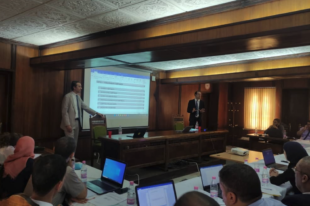Digital By Default: A Concept of Creating Digital Culture in the Audit Board of the Republic of Indonesia
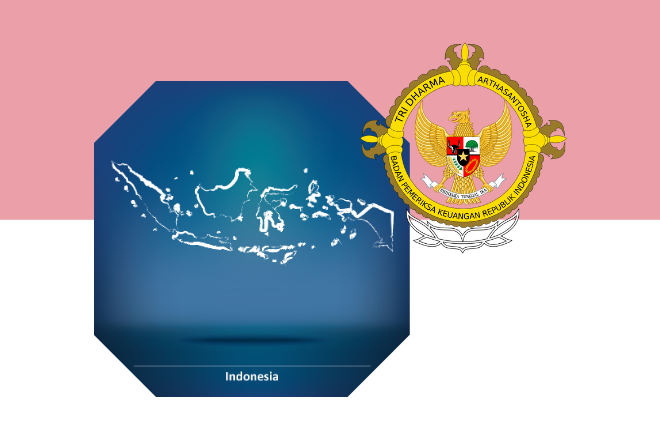
By: Pingky Dezar Zulkarnain, Audit Board of the Republic of Indonesia
Background
The COVID-19 pandemic has brought about unprecedented challenges, one of which is the imposition of physical activity restrictions to curb the spread of the virus (Abouk & Heydari, 2021). These restrictions have significantly altered the way the Audit Board of the Republic of Indonesia (BPK), carries out its auditing processes. In response to these restrictions, organizations and institutions have been forced to adapt and find innovative ways to continue their operations efficiently.
With the limitations on physical interactions, not only BPK, but also other Supreme Audit Institutions around the globe have turned to technology as a crucial tool in revamping their audit procedures (Ngoma, 2021). They have embraced remote work solutions, data analytics, and online communication platforms to conduct audits and gather necessary information. Auditors are now able to access financial records and documents electronically, reducing the need for in-person site visits. This shift towards technology-enabled audits not only enhances the efficiency of the audit process, but also minimizes potential health risks associated with physical inspections.
The optimization of technology to replace some physical activities In the auditing process not only allows for a more flexible and adaptable approach, but also has the potential to improve audit quality. Auditors can now focus more on data analysis and the interpretation of financial information, making the audit process more insightful and strategic. This shift towards a more tech-savvy audit approach has the potential to leave a lasting impact on how audits are conducted in the post-pandemic world.
Considering the rapid advancement of technology and the impact of the COVID-19 pandemic, the belief that more future audit processes will predominantly occur on digital platforms is gaining prominence. In an effort to harness the potential of technology, BPK has decided to embrace the concept of Digital by Default.
The Digital by Default concept signifies that BPK will prioritize the use of digital solutions in all aspects of their auditing procedures. This includes the adoption of digital audit applications, automated data analysis, and fully online reporting and communication. By embracing this approach, BPK aims to enhance efficiency, transparency, and accuracy in the execution of audits. Furthermore, this approach represents a significant advancement in addressing challenges associated with disparate auditee premises, particularly given Indonesia’s status as an archipelagic country comprised of numerous islands.
In addition to improving those aims, the Digital by Default concept also holds the potential to reduce costs and environmental impact associated with physical-based audit processes. Therefore, BPK is on a path to achieve more efficient and accurate audit outcomes while meeting the demands of an evolving digital era.
To realize Digital by Default, BPK employs an approach that focuses on the development of people, processes, and technology as its key targets (Harris Kern & Randy Johnson, 1998; Noyes, 2004; Ross et al., 2006). This strategy underscores the importance of aligning these three elements in the pursuit of a more digitally oriented and efficient organization.
Digital by Default: The People
Although there is no consensus of the definition of Digital by Default, BPK acknowledges the concept as one that pertains to the notion where digital elements play a role in facilitating the execution of business processes. This approach does not necessitate a fundamental requirement to utilize digital tools or techniques in project tasks. Instead, it shifts the responsibility to demonstrate the lack of practicality in using digital components when they are not employed in an organization.
BPK is striving to achieve Digital by Default through a holistic endeavor known as Digital Transformation. As part of Digital Transformation, the creation of a new culture in BPK is the most important. The most crucial element in culture development is the people, particularly in shaping their behavior. This cultural shift places people’s behavior at its core, emphasizing the need for employees to adapt to digital practices and embrace data-driven decision-making. The cultural shift, the so-called digital culture, encourages a collaborative environment where employees actively engage with technology, aligning their work processes with digital standards to enhance efficiency and effectiveness (UNESCO & Council of Europe, 2008). This transformation aims to empower BPK as an agile and forward-thinking organization, where the digital culture becomes ingrained in the everyday actions and mindset of its workforce.
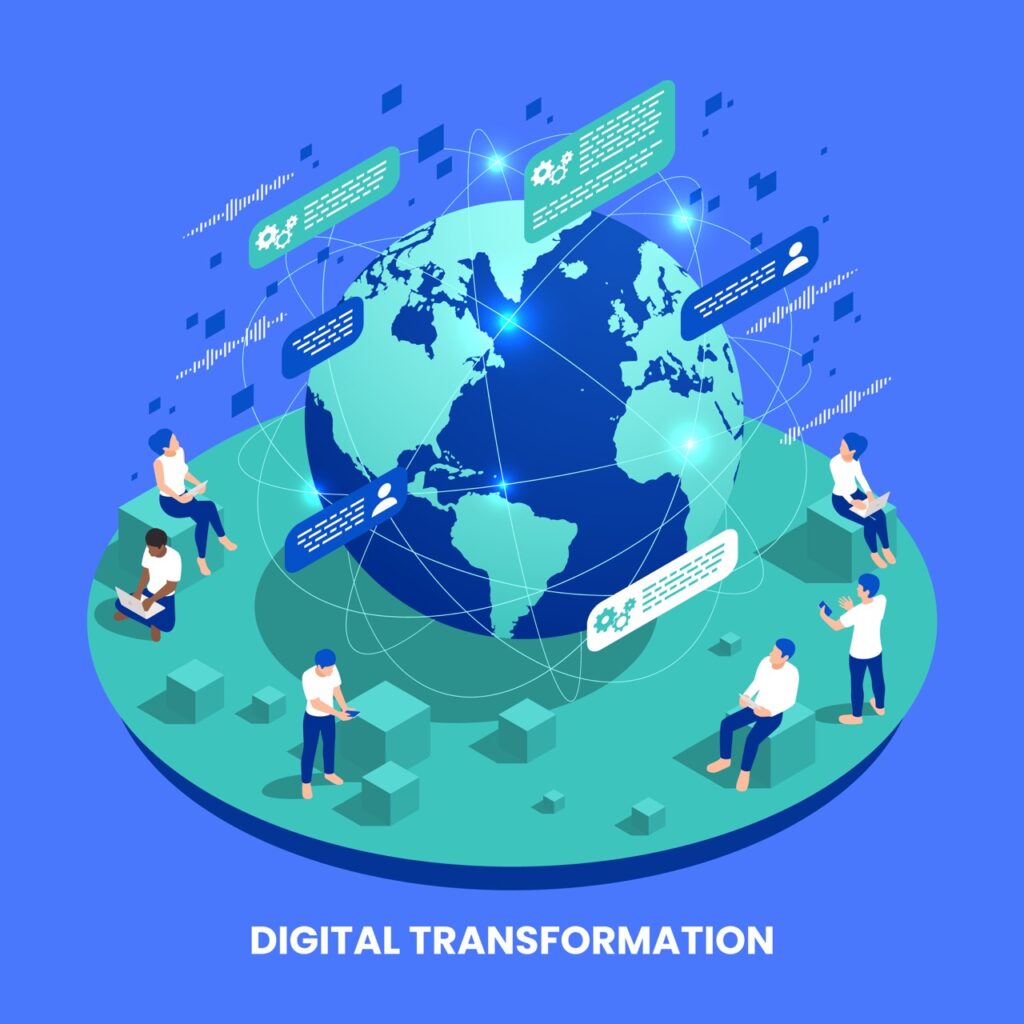
Digital by Default: The Processes
BPK has formulated a comprehensive strategy aimed at fostering the Digital by Default concept. This strategy places significant emphasis on the establishment of digital-based business processes, enhancing Information Technology Governance structures, and the development of Big Data Analytics (1). The intention behind these initiatives is to harness the power of technology and data to not only improve BPK’s business processes but also to enhance transparency, efficiency, and accountability in the processes.
By focusing on implementing the digital-based end-to-end business processes, BPK has to establish digital enterprise architecture. This initiative is essential for aligning the organization’s IT systems and data structures with its strategic objectives and business processes, facilitating the realization of the Digital by Default concept. This strategic focus ensures seamless integration of technology and operations in the pursuit of digital excellence.
In addition to digital enterprise architecture, it is pivotal to have the reinforcement of governance through strong IT governance to ensure that policies and procedures are in place to manage the digital platforms, to align with the BPK’s business processes, and to secure the flow of information that runs on top of the digital platforms. Furthermore, it plays a vital role in creating an environment of trust in the audit ecosystem covering the auditor, auditee, and stakeholders.
Finally, the development of Big Data Analytics represents the cutting-edge component of this strategy, enabling BPK to leverage the vast amounts of data generated in the digital age for insightful decision-making. By investing in these areas, BPK is taking a proactive approach towards achieving a more transparent, data-driven, and efficient audit ecosystem. Big Data Analytics is the essential component for creating the Data Culture, as a part of Digital Culture.
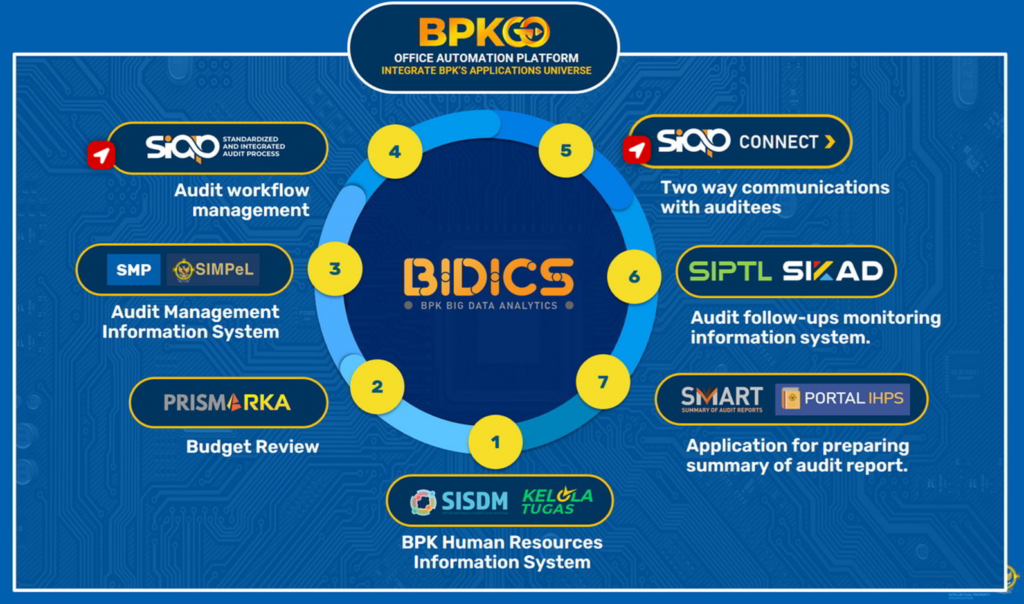
These three initiatives are outlined in BPK’s IT Strategic Plan (RINTIK) 2020-2024 as the three key pillars shaping the digital culture that settles BPK as a data-driven organization.
Digital by Default: The Technology
Digital Transformation and Digital by Default are multifaceted concepts that goes beyond just the implementation of applications or the extent to which business processes are operating on digital platforms. While applications are a critical component, the focus should be on a holistic shift toward digitalization and a fundamental change in how organizations operate on top of a digital platform.
In Digital Transformation, the availability of applications is an essential requirement. These applications, whether pre-existing or newly developed, must seamlessly connect with each other, and should be integrative or collaborative in nature. This integration ensures that data and processes flow cohesively, allowing for a unified and efficient digital ecosystem. This interconnectedness empowers businesses to make data-driven decisions and offer enhanced services to their customers.
Digital Transformation and Digital by Default are not about merely accumulating a vast array of applications or migrating every process to digital platforms. It’s about creating a synergistic environment where technology supports and enhances business processes, leading to improved productivity, agility, and innovation (Attrey et al., 2020; Leinwand & Mani, 2021). By fostering collaborative, interconnected applications, organizations can harness the full potential of the digital landscape, enabling them to adapt and thrive in an ever-evolving business environment.
In shaping a digital culture, information technology plays a pivotal role by prioritizing ease of use, speed, and accuracy. This emphasis on user-friendly, swift, and precise technology solutions is instrumental in enhancing overall productivity and fostering a digital-first mindset within an organization. However, even in the pursuit of efficiency and innovation, security must remain a primary consideration throughout every process undertaken.
While the pursuit of ease, speed, and accuracy is essential for improving operational efficiency and delivering a seamless digital experience, it should never come at the expense of security. In the digital age, safeguarding data, systems, and networks against cyber threats is of utmost importance. Therefore, a comprehensive approach to technology implementation that integrates both convenience and robust security measures is crucial in ensuring the success of any digital transformation initiative. Balancing these aspects creates a resilient digital culture where technology not only empowers but also protects an organization’s digital assets and reputation.
Currently, BPK has developed numerous applications for supporting more efficient business processes for human resources, audit management, performance management, and training, for example. Under the spirit of “Digital by Default”, these systems should be connected to one another. It is necessary to categorize these systems into an appropriate framework such as SAI Performance Management Framework (SAI PMF) for an institution like BPK.
The significance of technology in realizing the concept of “Digital by Default” lies in how it shapes the daily activities of employees. It entails a seamless integration of digital platforms into the routine tasks of the workforce, where video conferencing becomes the default mode for meetings, the review process naturally unfolds within applications, the audit correspondences occur within the digital platform, and training requests can be initiated with a simple click of a button on the designated application. This paradigm shift not only streamlines and accelerates operational processes, but also ingrains a digital-first mindset within the organization. It exemplifies how technology becomes an integral part of the organizational culture, making digital tools and platforms the default choice for a wide array of activities, ultimately driving efficiency and productivity while embracing the possibilities of the digital age (Hartl, 2019).
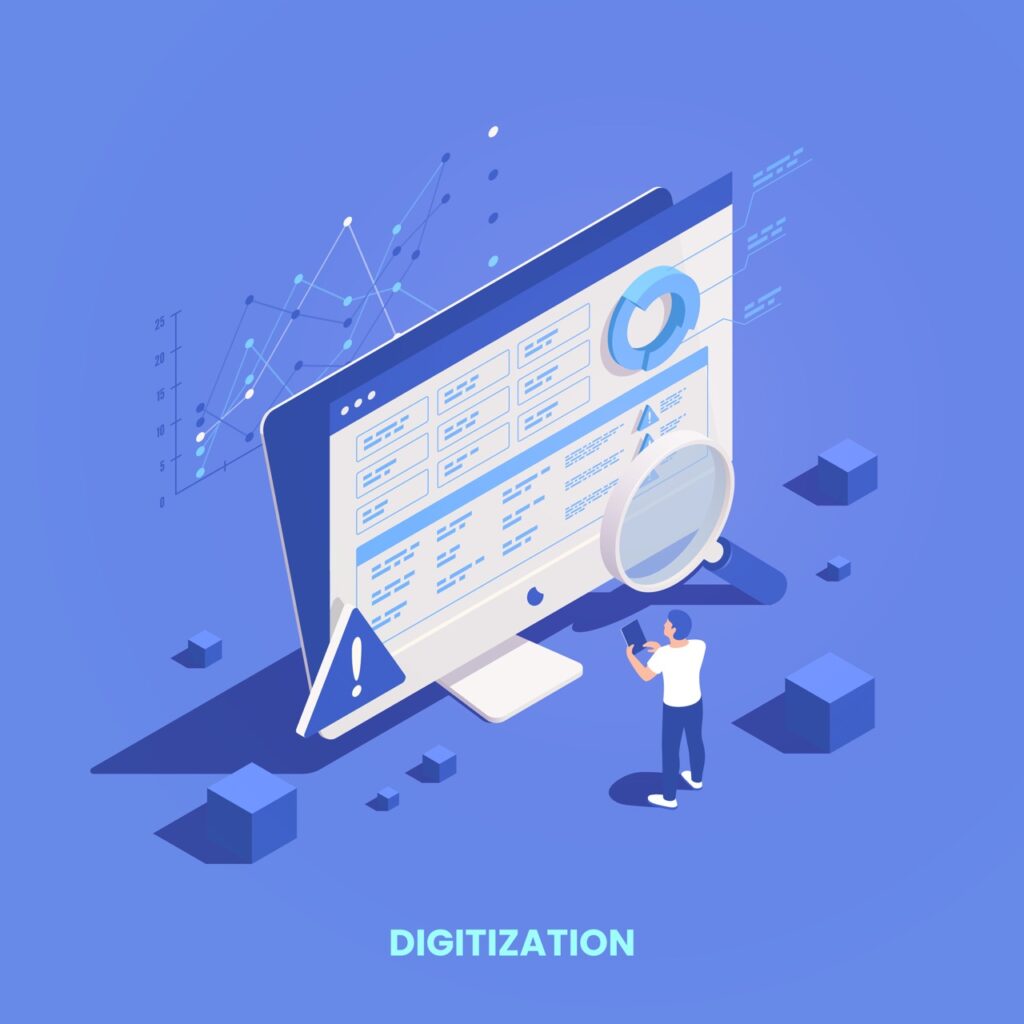
Conclusion
Looking ahead to the period leading up to 2024, the foremost task at hand is how the BPK can effectively eliminate work redundancies through technology, establish standardized business processes and data, drive process improvements, and implement automation in its business operations. Embracing digital transformation has revolutionized the audit process for SAI Indonesia by addressing challenges associated with the geographical dispersion of auditee premises, ultimately leading to more effective and efficient auditing in an island country like Indonesia. It can be done through several ways such as improved accessibility, enhanced communication, and real-time collaboration.
To achieve this, other SAIs that have similar condition with SAI Indonesia could start by establishing Enterprise Architecture. Enterprise Architecture is essential to extend and to improve business process of government auditing by optimizing the benefit of information and communication technology. This strategic direction highlights the commitment to optimizing efficiency and effectiveness in the SAI’s activities. By achieving these objectives, the SAI will not only enhance its own operational excellence but will also set a precedent for embracing digital transformation as a means to enhance transparency, accuracy, and the overall quality of the audit ecosystem. This forward-looking approach will undoubtedly contribute to a more agile, responsive, and technologically driven institution, poised to meet the challenges, and demands of the digital era.
(1) ICT Master Plan 2020-2024, page ii
About the author:
Pingky Dezar Zulkarnain presently serves as the Deputy Director of IT for IT Audit Support and Performance Management. Also, he acts as Head of BPK Big Data Analytics Laboratory. He earned a doctoral degree in Information and Communication Technology Policy Studies focused on Anti-Corruption from Waseda University, Japan.



